5. Black Panther
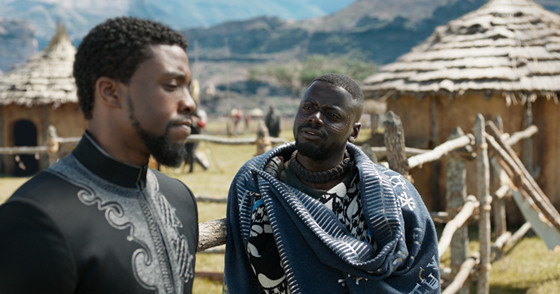
“Black Panther” has made quite an impact on the world, becoming the highest grossing superhero film in the United States and one of the most successful film of the genre. In addition, it has become a cultural phenomenon: the world of Wakanda and its characters are now known all over the world. The best aspect of the film may be its Afro-futuristic setting.
The world of Wakanda is a mixture of tribal tradition and an extremely developed technology based on vibranium, an element of which the country is rich and that has been hidden by Wakandians from the rest of the world. T’Challa, who was introduced to viewers in “Captain America: Civil War,” becomes king but has soon to face the evil Ulysses Klaw and Killmonger, who turns out to be his cousin and a rightful contender to the throne.
The film’s cultural impact is admirable, since it is the first film of this size to feature a largely black cast (Martin Freeman and Andy Serkis, both veterans from the Lord of the Rings films, often joked that they were the film’s “Tolkien white characters,” a reference to the token black characters that unfortunately are still present in many movies).
Yet, this should not distract from the fact that “Black Panther” is a somewhat confused mixture of genres and intentions. Sometimes it looks like a regular superhero film, then a James Bond film (with an abroad mission and a Q character, Shuri), then what seems like a Lion King parody, even done to a scene featuring the father’s spirit confronting his son.
These elements are not well balanced, and ultimately fall prey to the biggest issue with Marvel films: the need to set up future installments. “Black Panther” remains a more than enjoyable film, and has the merit of bringing up important issues, yet still lacks the internal coherence to make it the masterpiece many thought it was when it came out.
4. Annihilation
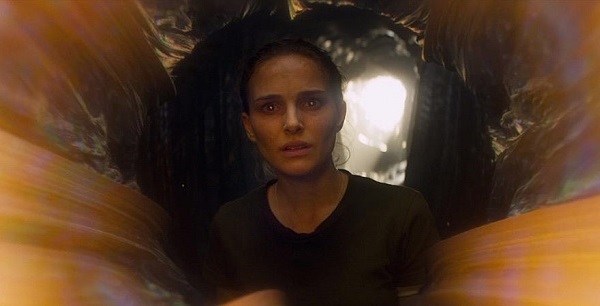
In recent years, Netflix has gone deeper and deeper into the world of cinema, trying to succeed in it in the same way it has with TV shows. Netflix is acquiring rights to an increasing number of films per year, while strongly investing into the production of movies of its own. Unfortunately, if the first attempts at making TV shows were a true success, with titles like “House of Cards” and “Orange is the New Black,” the movie division of Netflix has proven less solid.
Economically, the Netflix film productions can be successful, but the quality level of films they produce or release is not as strong. Many productions, like the recent “Bright” or “The Cloverfield Paradox,” are critically panned, while many other movies are simply low-quality products to meet the basic requirements of a certain genre.
“Annihilation” is a Paramount production, but when the studio grew concern for the possible reception of the film, Netflix quickly came in and got the digital distribution rights of the movie with the exception of the U.S. and Canada that still had an initial theatrical screening.
The film is directed by Alex Garland, and features some big names on its cast, like Natalie Portman, Oscar Isaacs and Jennifer Jason Leigh. The science-fiction plot, based on the books by Jeff VanderMeer, follows a team of female military members and research experts who try to uncover the mystery behind what seems to be a spreading alien ecosystem.
The film, while being well received, justifies the fears Paramount producers had. First of all, it heavily underuses the talents of its main cast, with Gina Rodriguez in particular giving an embarrassing take on the “tough but unstable military person,” never coming off as believable.
The story is certainly interesting from a science-fiction point of view, and worked very well on paper, but as a film it results as generic and underdeveloped as possible. Every new information about the alien environment is discovered too easily, preventing the viewer from being really invested in what is happening.
Finally, the film ends with and interminable (although visually captivating) sequence that makes the error of being an obvious consequence of what was set up earlier, and at the same time a confusing development of what has happened. All considered, a pretty shaky outcome and another entry in a long series of uneven recent sci-fi films.
3. Avengers: Infinity War
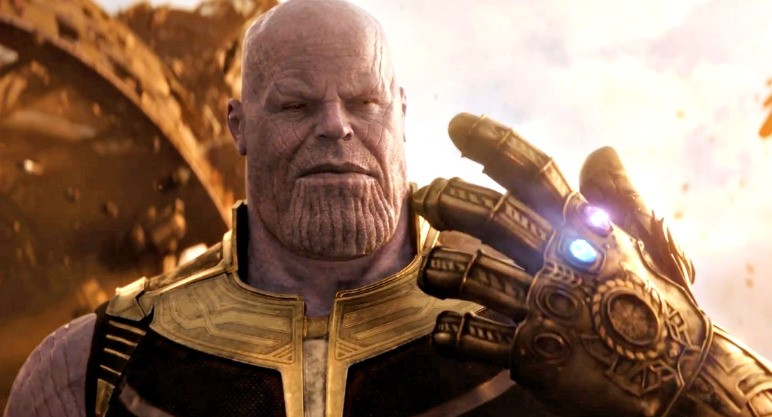
“Infinity War” has been the biggest cinematic event of the year so far and probably the most ambitious movie project since “Avatar” in 2009. This is because it stands as the culmination of 10 years of world building inside the Marvel Cinematic Universe.
Never before a film saga had exploited so vastly the possibility to crossover between films set in the same reality, and after many films of varying quality, “Infinity War” finally put all of the heroes of the Marvel Universe together in order to make them fight Thanos, the ultimate supervillain.
The very existence of such a film should be put into discussion: how can you stuff such an enormous number of characters and storylines into a movie and still make it credible from an artistic point of view? Sure, from the side of spectacularity, “Infinity War” was always a safe bet, but from a filmmaking point of view, it does not stand a chance to be taken seriously.
As with previous Avengers films, and also “Captain America: Civil War,” most chances of character development (a trait that every serious filmmaker should consider fundamental in a narrative film) are squashed under the need to fit so many elements into a single feature. The only character to actually have some substance is Thanos, and by substance we mean that he has an actual personality in the film.
As for the other characters, the heroes of the Marvel Universe, personality gets substituted by what can be called a collection of traits, the same traits that they have been assigned in their solo movies; still, these traits do not make them fully rounded characters at all.
Tony Stark is snarky, Peter Parker is naive, and so on, without a trace of development. And where would development take place in a film that has to sustain four or five parallel storylines at the same time? The characters in “Infinity War” are like action figures: you can move them around as much as you want, but they do not change at all.
Sure, a few moments of the film have some emotional value, like the death of Spider-Man, and the action is so bombastic that it cannot help but be entertaining. Still, such a behemoth of a film cannot be anything but plain entertainment without any additional value. It is always harder not to be nostalgic for those superhero films that had actual auteurs behind them, like Sam Raimi or Christopher Nolan.
2. Incredibles 2
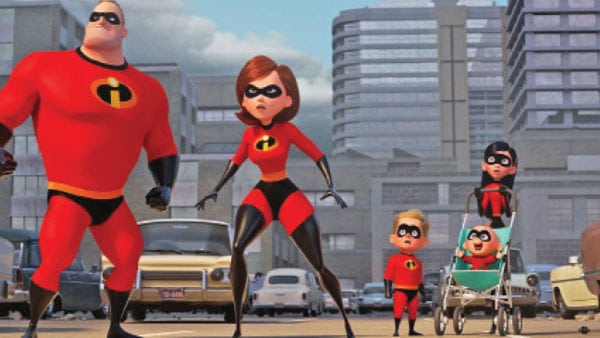
Even the most distracted moviegoer has probably noticed that in recent years, Pixar has increased the number of releases that are actually sequels or prequels to their films. The shift towards a sort of “franchise-ization” of the company certainly has something to do with the ownership of Pixar by Disney, which notoriously pushes for a number of profitable sequels that is as high as possible, but it can also be read as a desire from the filmmakers to revisit characters that they know and that are truly well-crafted, to the point that new stories about them can seem the most obvious choice.
Like “Finding Dory,” “Incredibles 2” fulfills this need from the public to revisit beloved characters. Pixar made the smart choice (as they usually do) by making original director Brad Bird helm the sequel, and it has to be said that the movie can be considered a really fun ride. Hence, the enormous success at the box office and the great satisfaction from critics.
Unfortunately, as charming as the film is, the hard truth is that such sequels are actually a bad thing for the world of entertainment cinema. To be clearer, “Incredibles 2” is a smart, fun and well-thought-out movie, but the fact that such a level of filmmaking has been devoted to a sequel diminishes Pixar and the credibility of the whole production. Sure, the viewer is entertained while they watch the movie, but as soon as it ends they should feel cheated.
The first “Incredibles” was a near perfect work, which opened with a bleak prospect of a world that was a slave to bureaucracy and lacked heroes, and ended with a resurgence of hope, while also telling in a believable way (for both kids and adults) the story of a family that recognizes its shortcomings and ultimately overcomes them by coming closer together.
Now, was there a need to continue such a story? Wasn’t the story already closed with the first ending? Every good thing in “Incredibles 2” is diminished by the fact that it is featured in an unnecessary film, and the production value behind the sequel could have been used on something original. We already fell in love with the Parrs in 2004, so maybe it was time to create new characters that would attract us again, for different reasons.
Sure, Pixar still does that with its original features, like the recent “Coco,” but if we have to be honest, we should admit that these sequels are a trick, an easy trap that has beloved characters as its bait. “Incredibles 2” is overrated because it is not nearly as original as it seems to be, and behind its undeniable charm actually hides a preoccupying lack of inventiveness from Pixar.
1. A Quiet Place
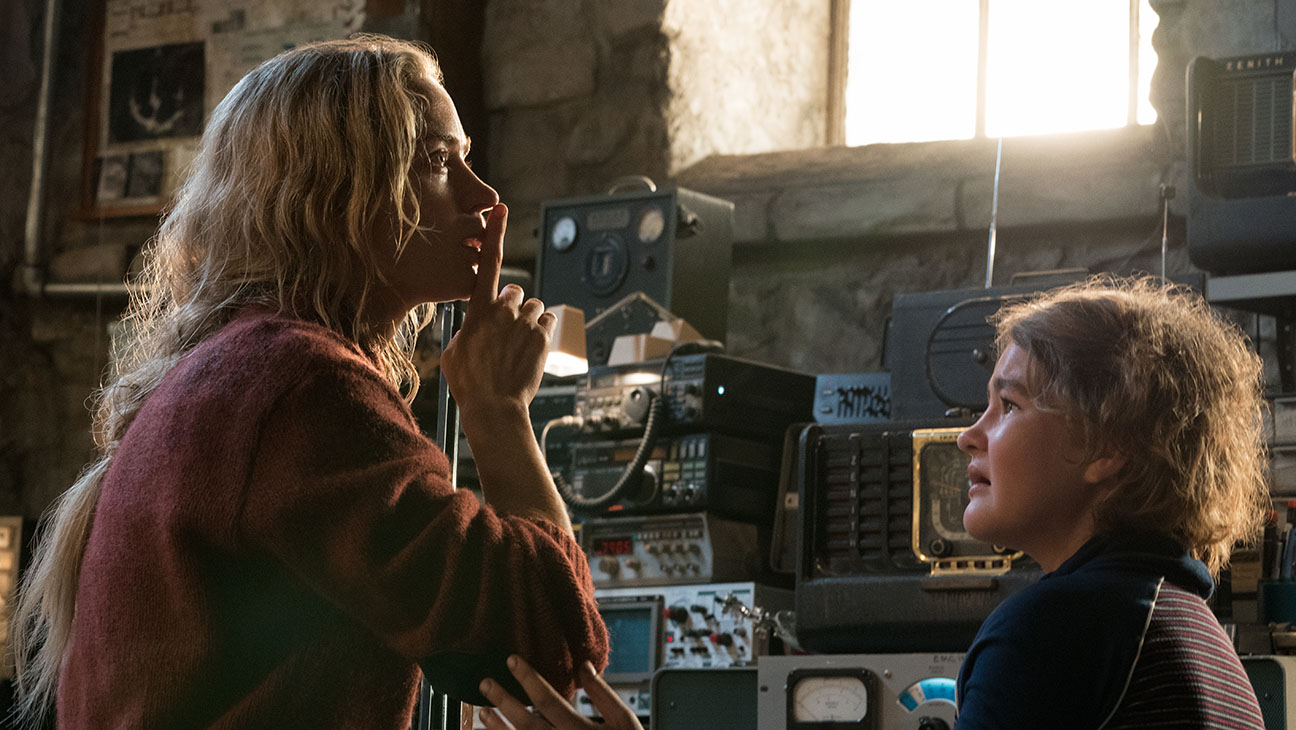
“A Quiet Place” is the directorial debut of John Krasinski, known to many for his comedic role as Jim in “The Office.” Through the years, Krasinski actually proved himself to be a versatile actor, with more roles in dramas and action films, and gathered various writing credits. Still, his debut as a director was somehow unexpected, or more precisely, a debut of such critical and commercial success was hard to imagine.
Having said that, Jordan Peele had recently done something similar with his “Get Out,” and the success of “A Quiet Place” certainly owes something to the new appreciation for “smart small-budget horror films” that “Get Out” has brought to the public.
Unfortunately, as much as a hit it was for the public and most of the critics, “A Quiet Place” falls short and is not the great achievement it seems to be. The film stars Krasinski and his real-life wife Emily Blunt, and it is based on an inventive premise: in the world of the film, aliens with super-hearing attack everything that makes a sound, so the survivors have to be careful and try not to talk.
The premise is enticing, and captured the attention of viewers, but it is not reason enough to build a whole film around it. It sounds more like a Twilight Zone premise, but there is a reason if Twilight Zone episodes were never longer than an hour. Moreover, there are various inconsistencies and plot-holes (it is not difficult to find articles that point out each of them).
This is not to say that “A Quiet Place” is a failure of a movie; on the contrary, it is an enjoyable horror film with dramatic tones, and the acting in it is consistent. But it is not an extraordinary movie, as many seemed to think it was when it came it. “A Quiet Place” falls in the category of OK films that, in a sea of mediocre features, seems actually greater than they are.